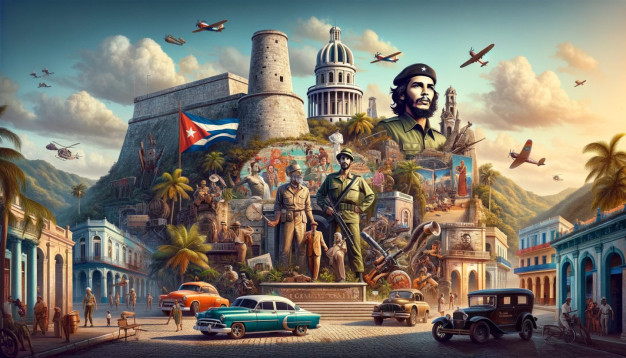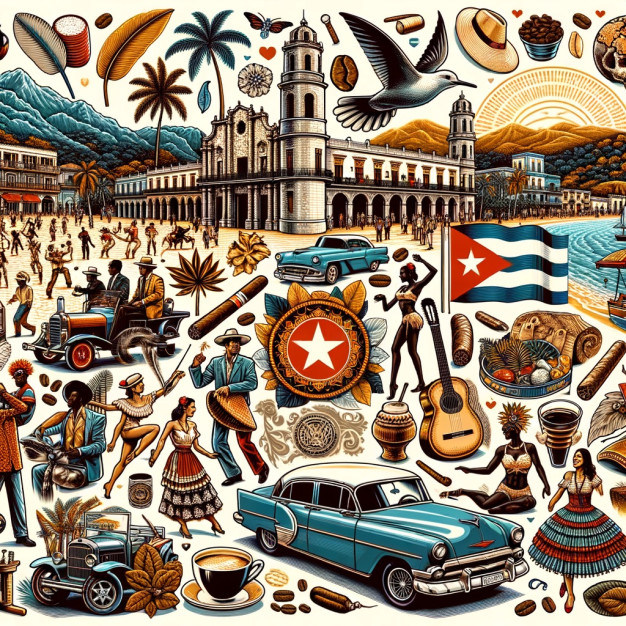Cuba’s Iconic Figures Unveiled
Explore the legacies of Fidel Castro, José Martí, and other Cuban luminaries.

Overview of Cuban Culture
Cuban culture is a vibrant tapestry woven from a blend of African, Spanish, and indigenous influences. Its unique identity shines through in its pulsating rhythms, vivid visual arts, and a literary tradition that challenges the mind and touches the heart.
Key Areas of Influence
From the cobblestone streets of Old Havana to the sugarcane fields in the valleys, Cuba’s influence permeates through revolutionary history, literary excellence, musical zest, and athletic prowess. The country’s icons are as diverse as its landscape, leaving indelible marks on the world stage.

Revolutionary Icons
Fidel Castro
The bearded face of Fidel Castro looms large over Cuba’s modern history. His audacious overthrow of a dictator and subsequent establishment of a communist state just a stone’s throw from the US is the stuff of legends—and heated debates. Whatever your take, his mark on Cuba is undeniable.
Che Guevara
The man in the iconic beret, Che Guevara, is perhaps the poster child for revolutionary cool. A master of guerrilla warfare and a symbol of rebellion, his image is plastered on dorm walls worldwide. Yet beyond the t-shirts and tattoos, Che’s legacy in Cuba is a complex tale of ideology and impact.
Camilo Cienfuegos
Not as globally renowned but equally cherished is Camilo Cienfuegos. With a smile as wide as his reputation for bravery, Camilo’s mysterious disappearance in 1959 only cemented his status as a folk hero. His catchphrase “Vas bien, Fidel” remains a classic nod to revolutionary camaraderie.

Literary Figures
José Martí
Hailed as a national hero, José Martí was not only a revolutionary but also a poet and intellectual whose passion for Cuba’s independence was matched only by his eloquence. His writings continue to inspire a sense of Cuban pride and identity.
Nicolás Guillén
The father of Afro-Cuban poetry, Nicolás Guillén, captured the rhythms of his people and the struggles of his race in verse that dances off the page. His work is both a celebration of culture and a punchy critique of social injustice.
Alejo Carpentier
A pioneer of magical realism, Alejo Carpentier wove together the real and the fantastic to explore the rich tapestry of Latin American history and identity. His novel “The Kingdom of this World” is an exquisite literary mojito, refreshing and potent in equal measure.
Ernest Hemingway
Ernest Hemingway, the Nobel Prize-winning American author, lived in Cuba for over two decades, from 1939 to 1960, often drawing inspiration from its vibrant culture and landscapes for his literary works. His residence, Finca Vigía, near Havana, became a place where he wrote some of his most celebrated novels, and his affection for the Cuban people and their traditions left a lasting impact on the island’s literary and cultural heritage.
Music and Arts
Celia Cruz
The Queen of Salsa, Celia Cruz, with her powerful voice and exuberant personality, is synonymous with Cuban music. Her famous cry of “¡Azúcar!” is not just a call to sweetness but a battle cry of joyous resilience.
Gloria Estefan
Leaving Havana as a child, Gloria Estefan took the Miami sound machine and turned it into a global phenomenon. Blending pop with Cuban beats, she broke barriers and records, proving that the Cuban rhythm is gonna get you.
Wifredo Lam
A painter who defied categorization, Wifredo Lam fused European modernism with Afro-Cuban symbolism, creating a visual lexicon that was as haunting as it was revolutionary. His masterpiece, “The Jungle,” is a tangled marvel of hybridity and resistance.

Sports Legends
Teófilo Stevenson
Heavyweight champion Teófilo Stevenson turned down million-dollar professional contracts to remain in Cuba, a move as powerful as his right hook. His Olympic golds are not just medals but symbols of Cuban sportsmanship and national pride.
Javier Sotomayor
Soaring over bars seemingly as high as the Sierra Maestra mountains, high jumper Javier Sotomayor embodied grace and strength. His world records stand tall, much like the man himself.
Mireya Luis
Volleyball virtuoso Mireya Luis spiked her way into history with a vertical leap that defied gravity. Her energetic play and relentless spirit made her an idol in sneakers and knee pads.
Political and Intellectual Contributors
Félix Varela
The priest and philosopher Félix Varela advocated for Cuban independence long before it was in vogue. His early calls for self-governance and social reform laid the groundwork for the nation’s quest for identity.
Carlos Manuel de Céspedes
Dubbed the “Father of the Homeland,” Carlos Manuel de Céspedes freed his slaves and ignited the spark of revolution in 1868. His act was as much about moral conviction as it was about political strategy.
Fernando Ortiz
An anthropologist extraordinaire, Fernando Ortiz coined the term “transculturation,” capturing the essence of Cuba’s blended cultural identity. His studies on everything from tobacco to Afro-Cuban rituals are essential reading for those seeking to understand the island’s soul.
Cuban-American Impact
Desi Arnaz
Desi Arnaz may have played the bumbling bandleader to Lucy’s antics on “I Love Lucy,” but his impact on television history is no joke. His innovation behind the scenes changed the face of American entertainment forever.
Ana de Armas
The enchanting Ana de Armas has taken Hollywood by storm with her versatility and charm. From a small town near Havana to the bright lights of Tinseltown, she’s a Cuban success story with a plot twist.
Pitbull
Mr. Worldwide himself, Pitbull, turned his Cuban heritage into a global brand. With a sharp suit and even sharper business acumen, he’s a reminder that the Cuban spirit is as entrepreneurial as it is exuberant.
Conclusion
Legacy and Influence
The icons of Cuba, much like the island’s famed vintage cars, are a colorful and enduring testament to resilience and creativity. Their legacies, wrapped in the warm breeze of the Caribbean, continue to inspire and provoke, much like a well-aged rum that warms the soul and stirs the mind. Whether through the arts, sports, or political thought, these figures have become woven into the fabric of not just Cuban identity, but world culture. Their stories, a blend of triumph, tragedy, and tenacity, are as compelling as the nation they represent. Cuba’s icons stand unveiled, inviting you to explore a land rich in history and heart.